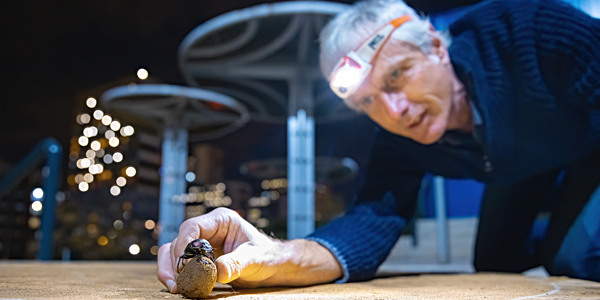How light pollution affects dung beetles
- Wits University
Light pollution makes it difficult for dung beetles to see the stars which they use to orientate, Wits researchers find.

As human populations continue to expand, so do cities, and with them, streetlights, security floodlights, and other sources of man-made illumination. These unnatural levels of light result in what is called “skyglow” – an upwelling of light, causing the night sky to glow unnaturally bright, and rendering all but the brightest stars invisible from view. Light pollution has long been known to negatively affect animals, particularly those which rely on darkness to hunt, but a new study provides insight into how city lights can disrupt the way an animal finds its way around.
In 2014, Wits Professor of Entomology, Prof. Marcus Byrne in the School of Animal, Plant and Environmental Sciences, was part of an international team that discovered that dung beetles use the stars to orientate themselves. This remarkable achievement received widespread publicity, and even got a mention on the television show, ‘The Big Bang Theory’.
“Given the level of light pollution in the modern world,” says Byrne, “we wondered how “skyglow” in the night skies of our cities would affect the ability of dung beetles to orientate themselves”.
Byrne and his team, involving scientists from the University of Würzburg in Germany, and Lund University in Sweden, found that South African dung beetles (Scarabaeus satyrus) are unable to use their star compass under a light-polluted sky. The findings of this research were published last week in the journal Current Biology.
When these nocturnal beetles find a fresh dung pile, they form small balls from it then roll them away to a safe spot, where they can bury and consume their meal without interference from other beetles. To avoid hungry competitors who may steal their dung balls, the beetles have to move quickly and purposefully away from the dung pile. “But before rolling away from the dung pile, the little guys sit atop their dung balls and do an orientation “dance” to get their bearings, explains Byrne. “Since the dung locality is always new, they use the Milky Way as a reference point from which they can decide which direction to travel in.”
To test how light pollution affects this ability, Byrne and team conducted experiments in which they measured how two sets of dung beetles chose to orientate themselves on the same night, under different conditions. One under the bright city lights of central Johannesburg, and one in a rural part of Limpopo province under a much more natural sky where the stars are not obscured by skyglow.
The team found that under light-polluted skies, dung beetles move towards bright artificial light sources such as streetlights or lights from buildings, rather than a destination they might otherwise choose when guided by the stars. This may result in dung beetles converging in the same spots, ending in more competition and fights between beetles for dung balls. Ultimately though, dung beetles may be unable to dig into the asphalt and concrete of the cities they are drawn to, in order to bury their dung balls, which may in turn affect their abilities to feed and reproduce.
"We suspect that light pollution may affect birds and moths in a similar way – it could force them to abandon their star compass and fly towards bright artificial lights in order to have any chance at all of holding their course," says Dr James Foster from the Biocentre at the University of Würzburg.
"Beetles that viewed direct light pollution behaved unnaturally, but were still oriented. But those that viewed light-polluted skies without brightly-lit buildings were completely disoriented," Foster explains.
“But the solution is simple”, explains Byrne. “We just need to switch off the lights. We need to be thoughtful about how we use this wonderful invention of ours, and we can reduce the effects that light pollution has on the world around us.”

